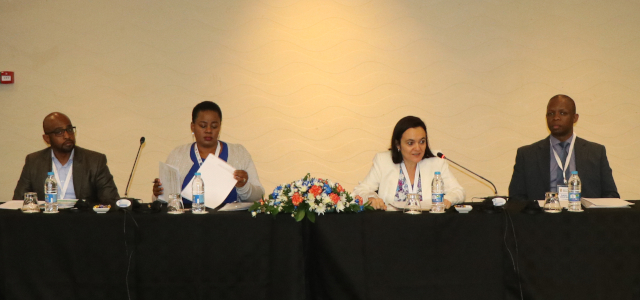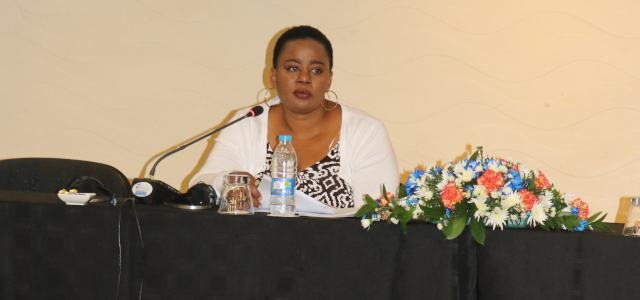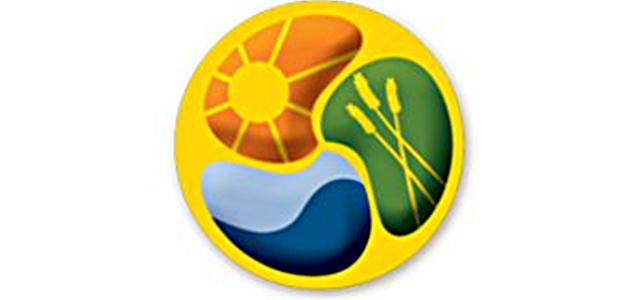The recently unveiled web-based Southern African Development Community (SADC) Water– Energy -Food (WEF) Nexus Investment Project Screening and Appraisal Tool is expected to assist its users to identify interlinkages, synergies and trade-offs between WEF security objectives, guide project appraisal to meet WEF Nexus Objectives.
The tool was developed by considering the different WEF Nexus parameters that are relevant to the region. The development process involved a series of Multistakeholder consultation and discussions between the WEF Working Group-SADC Secretariat, ministries of water, energy and food within the SADC Member States, the GWPSA and various experts. It was first introduced to member states at the SADC WEF Member States Workshop in March 2019 after which work was conducted to Convert it from a Microsoft Excel-based into a Web-Based Tool.
The tool forms part of the outcome of Phase 1 of the SADC NEXUS Dialogue Project, “Fostering Water, Energy and Food Security Nexus Dialogue and Multi-Sector Investment in the SADC Region”.
In her opening remarks during the workshop to present, test, and review the tool, Ms Mercedes MARIN NORTES, Delegation of the European Union to Botswana and SADC noted the remarkable progress the Southern Africa Region has made regarding the project.

Ms Mercedes Marin Nortes, Delegation of the European Union to Botswana and SADC, delivering her opening remarks
“Based on the evaluation carried out by the EU the SADC region recorder the highest progress in the project. Key to this progress is the good partnership between the EU, SADC Secretariat, GWPSA and other partners.”, said Ms Marin.
She indicated that preparations are underway for the second phase of the project which will focus more on concrete demonstration projects, following up on the pipeline identified during the first phase.
The SADC NEXUS Dialogue Project is supported by the European Commission as part of the Global "Nexus Dialogues Programme", being implemented in the southern African Region by the Global Water Partnership Southern Africa (GWPSA) on behalf of the SADC Secretariat. It is part of a larger “Nexus Dialogues” Programmes targeting the following regions:
- Africa (SADC and Niger);
- Latin America (Andean region);
- Central Asia (Aral Sea region);
- Neighbourhood (with particular focus on the Mediterranean).
Integrated WEF security was identified by the Davos World Economic Forum (2008, 2015, 2016 ) as one of the greatest challenges to the global economy and sustainable development in the decades ahead, which needed urgent action. The EU, in 2015, committed to supporting a global ‘Nexus Dialogues Programme" to further encourage a more rigorous analysis of nexus challenges.
The overall objective of the Nexus project is to support the transformation required to meet increasing water, energy and food security demand in a context of climate change in the SADC Region through the development of a truly integrated nexus approach.
In her remarks Ms Pamela Temu, Senior Hydrologist in the Ministry of Water, Tanzania, the current SADC Chair urged all participants to be ambassadors of the nexus approach implementation and take it forward in their various occupations as it provides a distinct opportunity for delivery of regional integration, and development in the SADC region.

Ms Pamela Temu, from Tanzania’s Ministry of Water, delivering her remarks
“Governments will not only recognize the WEF tool and framework but also commit to its implementation to ensure that coordinated actions lead to the most effective, equitable and sustainable solutions, “she said.
The tool together with the framework will inform the next Regional Strategic and Action Plan (RSAP) on Integrated Water Resources Management and Development and regional investment Portfolio, which represents the next generation of investment projects. This will help identify the proper placement of projects going forward for the next decade.
The Nexus approach highlights the interdependencies between achieving water, energy and food security for human well-being while ensuring ecologically sustainable use of globally essential resources. It bridges traditional divides between sec¬tors and stakeholders takes a long term perspective that is relevant to all major international processes aimed at sustainable devel-op¬ment, including the achievement of the Sustainable Development goals (SDGs). SDG 6 (water), 7 (energy) and 2 (food security) are not only closely connected to each other but also eminently important for the Nexus approach. The WEF Nexus is, therefore, a central pillar of Agenda 2030, as an enabler of sustainable development in its three dimensions
Furthermore, water, energy and food (WEF) security are key priority areas for SADC as noted in 2018 by the Ministers in charge of food security, water security and energy security in their reports to the SADC Council of Ministers. Integrated planning of water, food and energy sectors and promoting regional cooperation has been considered as a strategy to simultaneously meet water, energy and food security targets, and to improve natural resource use efficiencies in the region.
The current RSAP IV (2016-2020) consists of 8 programmes, of which one is focused on the Water, Energy, and Food (WEF) Security Nexus. Moreover, SADC has a huge array of policies that support WEF. These include but are not limited to:
- The SADC Revised Protocol on Shared Watercourses (2000)
- Regional Water Policy (2005) and Strategy (2006)
- A 5-year Regional Water Programme: Regional Strategic Action Plans (RSAPs)
- The Protocol on Energy (1996)
- SADC Energy Action Plan (1997)
- A Renewable Energy and Energy Efficiency Strategy and Action Plan (REEESAP) (2016)
- Regional Agricultural Policy (RAP) (2014)
- Regional Agricultural Investment Plan (2017-2022-draft)
- SADC Food and Nutrition Strategy (2015-2025) (2014)
The WEF Nexus Workshop was held in Johannesburg, South Africa on 17-18 September 2019. It was convened by the SADC Secretariat with the support of GWPSA and hosted by the government of South Africa through the Department of Water and Sanitation . It was attended by representatives of the WEF sectors of Member States, Youth, SADC Secretariat’s water, energy and food security divisions, WEF Nexus Implementing Partners, International Cooperating Partners, Consultants and other WEF Nexus stakeholders.
